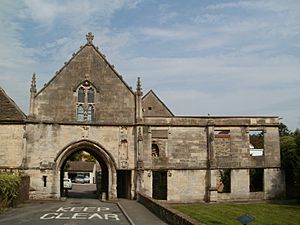Kingswood Abbey facts for kids
Quick facts for kids Kingswood Abbey |
|
|---|---|

The gatehouse of the abbey
|
|
| Type | Abbey |
| Location | Kingswood, Stroud District |
| OS grid reference | ST 74705 92035 |
| Area | Gloucestershire |
| Built | 1139 |
| Owner | English Heritage |
| Official name: Kingswood Abbey gate | |
| Reference no. | 1004872 |
|
Listed Building – Grade I
|
|
| Official name: Abbey gatehouse and adjoining wall to east | |
| Designated | 23 June 1952 |
| Reference no. | 1238022 |
| Lua error in Module:Location_map at line 420: attempt to index field 'wikibase' (a nil value). | |
Kingswood Abbey was a special kind of monastery called an abbey. It was built a long, long time ago by Cistercian monks. You could find it in the village of Kingswood in Gloucestershire, England. Sadly, most of the abbey was torn down during a time called the Dissolution of the Monasteries. Today, the only part left is a beautiful old building called the gatehouse. This gatehouse is a very important historical site.
Contents
History of Kingswood Abbey
Kingswood Abbey was started in the year 1139. A man named William of Berkeley founded it. He did this because his uncle, Roger II of Berkeley, wanted it to happen. The first monks came from another Cistercian monastery called Tintern Abbey in Monmouthshire. The Berkeley family, who were powerful landowners in Dursley, helped to set up the abbey.
Early Challenges and Changes
In the middle of the 1100s, the abbot and most of the monks left Kingswood. They first moved to a place called Hazleton Abbey. Then they moved again to Tetbury because there wasn't enough water at Hazleton. During this time, Kingswood became a "grange." This meant it was like a farm run by the monks, not a full abbey. Later, the monks returned to Kingswood, settling near their original spot.
Life at the Abbey
We know a little about how the abbey was doing financially. Around 1291, the abbey's yearly income was about £54. This money came from their spiritual activities and their land. By the time the Dissolution of the Monasteries happened, the abbey was worth about £245.
In 1517, there was a big problem at the abbey. The King appointed a new abbot, which made the monks and local people very angry. They started a riot! A powerful noble, Edward Stafford, 3rd Duke of Buckingham, had to step in to calm things down.
After the Dissolution
When King Henry VIII ordered the Dissolution of the Monasteries, Kingswood Abbey was mostly destroyed. The King first rented the abbey's land to a courtier named Sir Nicholas Poyntz for 21 years. Later, in 1559, Queen Elizabeth I gave the land to Sir John Thynne. Sir John Thynne was famous for building the grand house called Longleat.
Some very old financial records from the abbey still exist. These records, from 1240-41 and 1241-42, might be the oldest of their kind!
What Remains Today
Today, the most important part of Kingswood Abbey that you can still see is the gatehouse. This gatehouse was built in the early 1500s. It is now looked after by English Heritage, an organization that protects historical sites.
The rest of the abbey and its church were taken apart so well that we don't even know their exact location anymore. The gatehouse is special because it has many beautiful decorations. You can see carved designs on its roof, and it used to have statues in special spots. Only one statue remains now. The gatehouse also has lovely windows with carved stone dividers. The part of the gatehouse on the right side is just a front, but the part on the left is still lived in today.
A few miles away, there is a place called Calcot Manor. This building was originally a tithe barn. It was built by the monks of Kingswood Abbey to store the crops they collected as taxes. We also know that 48 original documents from Kingswood Abbey, written between 1225 and 1444, were sold at an auction in 1945.
Burials
- Elizabeth de Berkeley, Countess of Warwick
 | Georgia Louise Harris Brown |
 | Julian Abele |
 | Norma Merrick Sklarek |
 | William Sidney Pittman |

